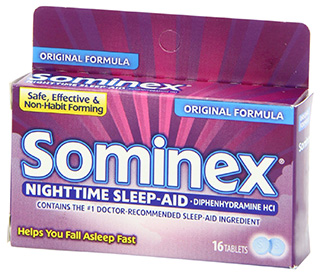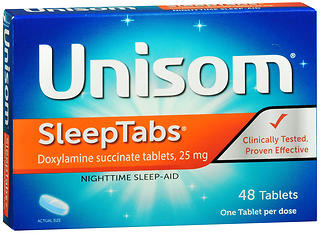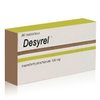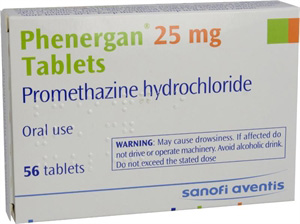Drug Name
Sominex (Diphenhydramine)
Drug Uses
Sominex is used to suppress coughs, to treat motion sickness, to induce sleep, and to treat mild forms of Parkinson’s disease.
Sominex is also used to treat sneezing; runny nose; itching, watery eyes; hives; rashes; itching; and other symptoms of allergies and the common cold.
Sominex may also be used for purposes other than those listed in this medication guide.
How to use
As a sleep aid, Sominex should be taken approximately 30 minutes before bedtime.
Take each dose with a full glass of water.
Sominex can be taken with or without food.
For motion sickness, a dose is usually taken 30 minutes before motion, then with meals and at bedtime for the duration of exposure.
To ensure that you get a correct dose, measure the liquid forms of Sominex with a special dose-measuring spoon or cup, not with a regular tablespoon. If you do not have a dose-measuring device, ask your pharmacist where you can get one.
Never take more of this medication than prescribed for you. The maximum amount of Sominex that you should take in any 24-hour period is 300 mg.
Drug Class and Mechanism
Sominex is an antihistamine. Sominex blocks the effects of the naturally occurring chemical histamine in the body.
Missed Dose
Take the missed dose as soon as you remember. However, if it is almost time for the next dose, skip the missed dose and take only the next regularly scheduled dose. Do not take a double dose of this medication unless otherwise directed by your doctor.
Storage
Store Sominex at room temperature away from moisture and heat.
Warnings/Precautions
Do not take Sominex if you have taken a monoamine oxidase inhibitor (MAOI) such as isocarboxazid (Marplan), phenelzine (Nardil), or tranylcypromine (Parnate) in the last 14 days. A very dangerous drug interaction could occur, leading to serious side effects.
Before taking this medication, tell your doctor if you have
glaucoma or increased pressure in the eye;
a stomach ulcer;
an enlarged prostate, bladder problems or difficulty urinating;
an overactive thyroid (hyperthyroidism);
hypertension or any type of heart problems; or
asthma.
You may not be able to take diphenhydramine, or you may require a lower dose or special monitoring during treatment if you have any of the conditions listed above.
Sominex is in the FDA pregnancy category B. This means that it is not expected to be harmful to an unborn baby. Do not take Sominex without first talking to your doctor if you are pregnant. Infants are especially sensitive to the effects of antihistamines, and side effects could occur in a breast-feeding baby. Do not take Sominex without first talking to your doctor if you are nursing a baby. If you are over 60 years of age, you may be more likely to experience side effects from Sominex. You may require a lower dose of this medication.
Possible Side Effects
Stop taking diphenhydramine and seek emergency medical attention if you experience an allergic reaction (difficulty breathing; closing of your throat; swelling of your lips, tongue, or face; or hives).
Other, less serious side effects may be more likely to occur. Continue taking diphenhydramine and talk to your doctor if you experience
sleepiness, fatigue, or dizziness;
headache;
dry mouth; or
difficulty urinating or an enlarged prostate.
Side effects other than those listed here may also occur. Talk to your doctor about any side effect that seems unusual or that is especially bothersome.
More Information
Do not take Sominex if you have taken a monoamine oxidase inhibitor (MAOI) such as isocarboxazid (Marplan), phenelzine (Nardil), or tranylcypromine (Parnate) in the last 14 days. A very dangerous drug interaction could occur, leading to serious side effects.
Talk to your pharmacist before taking other over-the-counter cough, cold, allergy, or insomnia medications. These products may contain medicines similar to Sominex, which could lead to an antihistamine overdose.
Before taking this medication, tell your doctor if you are taking any of the following medicines:
anxiety or sleep medicines such as alprazolam (Xanax), diazepam (Valium), chlordiazepoxide (Librium), temazepam (Restoril), or triazolam (Halcion);
medications for depression such as amitriptyline (Elavil), doxepin (Sinequan), nortriptyline (Pamelor), fluoxetine (Prozac), sertraline (Zoloft), or paroxetine (Paxil); or
any other medications that make you feel drowsy, sleepy, or relaxed.
Drugs other than those listed here may also interact with Sominex. Talk to your doctor and pharmacist before taking any prescription or over-the-counter medicines, including vitamins, minerals, and herbal products.










Reviews
There are no reviews yet.